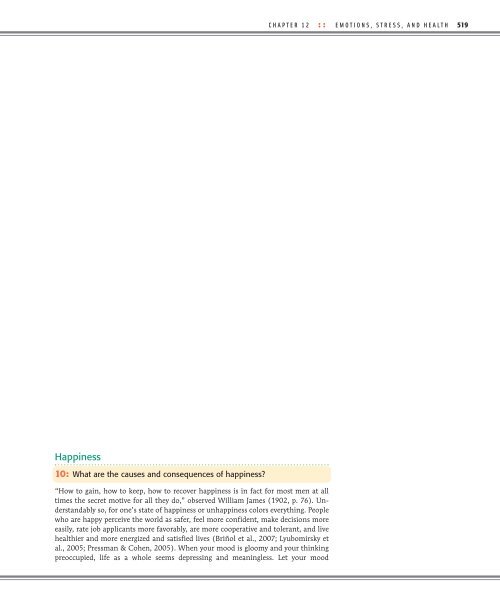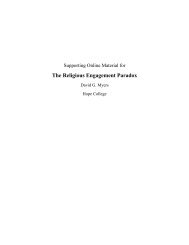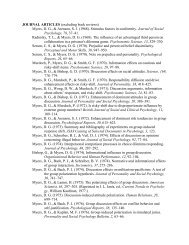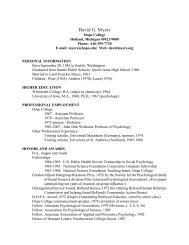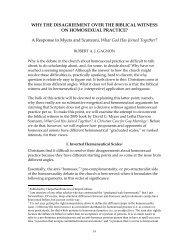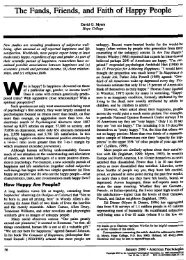Happiness - Myers, David
Happiness - Myers, David
Happiness - Myers, David
You also want an ePaper? Increase the reach of your titles
YUMPU automatically turns print PDFs into web optimized ePapers that Google loves.
C H A P T E R 1 2 : : E M O T I O N S , S T R E S S , A N D H E A L T H 519<br />
<strong>Happiness</strong><br />
10: What are the causes and consequences of happiness?<br />
“How to gain, how to keep, how to recover happiness is in fact for most men at all<br />
times the secret motive for all they do,” observed William James (1902, p. 76). Understandably<br />
so, for one’s state of happiness or unhappiness colors everything. People<br />
who are happy perceive the world as safer, feel more confident, make decisions more<br />
easily, rate job applicants more favorably, are more cooperative and tolerant, and live<br />
healthier and more energized and satisfied lives (Briñol et al., 2007; Lyubomirsky et<br />
al., 2005; Pressman & Cohen, 2005). When your mood is gloomy and your thinking<br />
preoccupied, life as a whole seems depressing and meaningless. Let your mood
520 C H A P T E R 1 2 : : E M O T I O N S , S T R E S S , A N D H E A L T H<br />
::feel-good, do-good phenomenon<br />
people’s tendency to be helpful when<br />
already in a good mood.<br />
::subjective well-being self-perceived<br />
happiness or satisfaction with life. Used<br />
along with measures of objective wellbeing<br />
(for example, physical and economic<br />
indicators) to evaluate people’s<br />
quality of life.<br />
brighten, and your thinking broadens and becomes more playful and creative (Amabile<br />
et al., 2005; Fredrickson, 2006; King et al., 2006). Your relationships, your selfimage,<br />
and your hopes for the future also seem more promising. Positive emotions<br />
fuel upward spirals.<br />
This helps explain why college students’ happiness helps predict their life course.<br />
In one study, women who smiled happily (rather than smiling artificially or not at<br />
all) in 1950s college yearbook photos were more likely to be married, and happily so,<br />
in middle age (Harker & Keltner, 2001). In another study, which surveyed thousands<br />
of U.S. college students in 1976 and restudied them at age 37, happy students had<br />
gone on to earn significantly more money than their less-happy-than-average peers<br />
(Diener et al., 2002). Nonetheless, it’s also true that social reforms are often<br />
launched, as well as great literature written, by those not extremely happy with how<br />
things are (Oishi et al., 2007).<br />
Moreover—and this is one of psychology’s most consistent findings—when we feel<br />
happy we more often help others. In study after study, a mood-boosting experience<br />
(finding money, succeeding on a challenging task, recalling a happy event) has made<br />
people more likely to give money, pick up someone’s dropped papers, volunteer time,<br />
and do other good deeds. Psychologists call it the feel-good, do-good phenomenon<br />
(Salovey, 1990). <strong>Happiness</strong> doesn’t just feel good, it does good. (Doing good also promotes<br />
good feeling, a phenomenon harnessed by some happiness coaches and instructors<br />
as they assign people to perform a daily “random act of kindness” and to<br />
record the results.)<br />
Despite the significance of happiness, psychology throughout its history has more<br />
often focused on negative emotions. Since 1887, Psychological Abstracts (a guide to<br />
psychology’s literature) has included, as of this writing, 14,889 articles mentioning<br />
anger, 93,371 mentioning anxiety, and 120,897 mentioning depression. For every 17<br />
articles on these topics, only 1 dealt with the positive emotions of joy (1789), life satisfaction<br />
(6255), or happiness (5764). There is, of course, good reason to focus on<br />
negative emotions; they can make our lives miserable and drive us to seek help. But<br />
researchers are becoming increasingly interested in subjective well-being, assessed<br />
either as feelings of happiness (sometimes defined as a high ratio of positive to negative<br />
feelings) or as a sense of satisfaction with life. A new positive psychology is on the<br />
rise (see Chapter 13).<br />
➤ FIGURE 12.18<br />
Moods across the day When psychologist<br />
<strong>David</strong> Watson (2000) sampled nearly 4500<br />
mood reports from 150 people, he found<br />
this pattern of variation from the average<br />
levels of positive and negative emotions.<br />
0.5<br />
Average<br />
mood<br />
0.4<br />
levels 0.3<br />
0.2<br />
0.1<br />
0<br />
-0.1<br />
-0.2<br />
-0.3<br />
-0.4<br />
-0.5<br />
Positive emotion<br />
Negative emotion<br />
The Short Life of Emotional Ups and Downs<br />
In their happiness research, psychologists have studied influences on both our temporary<br />
moods and our long-term life satisfaction. When studying people’s hour-by-hour<br />
moods, <strong>David</strong> Watson (2000) and Daniel Kahneman and his colleagues (2004) discovered<br />
that positive emotion rises over the early to middle part of most days (FIGURE 12.18).<br />
Stressful events—an argument, a sick child, a car problem—trigger bad moods. No surprise<br />
there. But by the next day, the gloom nearly always<br />
lifts (Affleck et al., 1994; Bolger et al., 1989;<br />
Stone & Neale, 1984). If anything, people tend to rebound<br />
from bad days to a better-than-usual good<br />
mood the following day. When in a bad mood, can<br />
you usually depend on rebounding within a day or<br />
two? Are your times of elation similarly hard to sustain?<br />
Over the long run, our emotional ups and<br />
downs tend to balance.<br />
Apart from prolonged grief over the loss of a<br />
loved one or lingering anxiety after a trauma (such<br />
as child abuse, rape, or the terrors of war), even<br />
tragedy is not permanently depressing:<br />
0 1 2 3 4 5 6 7 8 9 10 11 12 13 14 15 16<br />
Time since rising (hours)
C H A P T E R 1 2 : : E M O T I O N S , S T R E S S , A N D H E A L T H 521<br />
• Learning that one is HIV-positive is devastating. But after<br />
five weeks of adapting to the grim news, those who have<br />
tested positive report feeling less emotionally distraught than<br />
they had expected (Sieff et al., 1999).<br />
• Kidney dialysis patients recognize that their health is relatively<br />
poor, yet in their moment-to-moment experiences they report<br />
being just as happy as healthy nonpatients (Riis et al., 2005).<br />
• European 8- to 12-year-olds with cerebral palsy experience<br />
normal psychological well-being (Dickinson et al., 2007).<br />
“If you are a paraplegic,” explains Daniel Kahneman (2005),<br />
“you will gradually start thinking of other things, and the more<br />
time you spend thinking of other things the less miserable you<br />
are going to be.” A major disability often leaves people less happy<br />
than average, yet happier than able-bodied people with depression (Kübler et al.,<br />
2005; Lucas, 2007a,b; Oswald & Powdthavee, 2006; Schwartz & Estrin, 2004). Even<br />
patients “locked-in” a motionless body “rarely want to die,” report Eimar Smith and<br />
Mark Delargy (2005), which “counters a popular misconception that such patients<br />
would have been better off dead.”<br />
In less life-threatening contexts, the pattern continues. Faculty members up for<br />
tenure expect their lives would be deflated by a negative decision. Actually, 5 to 10<br />
years later, those denied are not noticeably less happy than those who were awarded<br />
tenure, reported Daniel Gilbert and colleagues (1998). The same is true of romantic<br />
breakups, which feel devastating. The surprising reality: We overestimate the duration<br />
of our emotions and underestimate our capacity to adapt.<br />
Positive emotions are similarly hard to sustain. In Rethinking <strong>Happiness</strong>: The Science<br />
of Psychological Wealth, Ed Diener and Robert Biswas-Diener (2009) illustrate the<br />
short life of most emotions with daily happiness reports of a 21-year-old student undergoing<br />
treatment for Hodgkins disease, a cancer of the immune system. Midway<br />
through his 80 daily reports, the young man learned the treatment had effectively<br />
wiped out his cancer. As FIGURE 12.19 shows, on the day he received this wonderful<br />
news, he was elated. But although the ensuing month was relatively free of down-inthe-dumps<br />
days, his emotions soon returned to near their previous level, with fluctuations<br />
in response to daily events.<br />
Human resilience Seven weeks after her<br />
1994 wedding, Anna Putt of South Midlands,<br />
England, shown here with her husband, Des,<br />
suffered a brainstem stroke that left her<br />
“locked-in.” For months after, she recalls, “I<br />
was paralyzed from the neck down and was<br />
unable to communicate. These were VERY<br />
frightening times. But with encouragement<br />
from family, friends, faith, and medical staff, I<br />
tried to keep positive.” In the ensuing three<br />
years, she became able to “talk” (by nodding<br />
at letters), to steer an electric wheelchair<br />
with her head, and to use a computer (by<br />
nodding while wearing spectacles that guide<br />
a cursor). Despite her paralysis, she reports<br />
that “I enjoy going out in the fresh air. My<br />
motto is ‘Don’t look back, move forward.’<br />
God would not want me to stop trying and I<br />
have no intention of doing so. Life is what<br />
you make of it!”<br />
▲<br />
Courtesy of Anna Putt<br />
Daily<br />
negative to<br />
positive<br />
moods<br />
6<br />
5<br />
4<br />
3<br />
Cancer-free diagnosis<br />
“Weeping may tarry for the night,<br />
but joy comes with the morning.”<br />
Psalm 30:5<br />
2<br />
1<br />
0<br />
–1<br />
–2<br />
–3<br />
2 10 20 30 40 50 60 70<br />
Days<br />
➤ FIGURE 12.19<br />
The short life of strong<br />
emotions A university<br />
student’s daily reports of<br />
negative and positive<br />
moods revealed day-to-day<br />
fluctuations, punctuated<br />
by temporary elation on<br />
the day he learned that<br />
he was now cancer<br />
free. (From Diener &<br />
Biswas-Diener, 2009.)
522 C H A P T E R 1 2 : : E M O T I O N S , S T R E S S , A N D H E A L T H<br />
• In both World Values Surveys in 97<br />
countries (Inglehart, 2008) and<br />
Gallup (2008) surveys in 130<br />
countries, the highest self-reported<br />
happiness was found in Denmark. •<br />
C. Harley Schwadron/www.cartoonstock.com<br />
“Money won’t make you happy, Waldron.<br />
So instead of a raise, I’m giving a Prozac.”<br />
Wealth and Well-Being<br />
“Do you think you would be happier if you made more money?” Yes, replied 73 percent<br />
of Americans in a 2006 Gallup poll. How important is “Being very well off financially?”<br />
In recent years, this has, for entering U.S. collegians, been ranked first or<br />
second among 21 possible objectives. Some 3 in 4 students rate their top two objectives—<br />
being “very well off” and “raising a family”—as “extremely important” or “essential”<br />
(FIGURE 12.20).<br />
There is evidence that wealth, to a point, correlates with well-being. Consider:<br />
• Within most countries, though especially in poor countries, individuals with lots<br />
of money are typically happier than those who struggle to afford life’s basic<br />
needs (Diener & Biswas-Diener, 2009; Howell & Howell, 2008). They also, as we<br />
will see later in this chapter, often enjoy better health than those stressed by<br />
poverty and lack of control over their lives.<br />
• People in rich countries are also somewhat happier than those in poor countries<br />
(Inglehart, 2009).<br />
• Those who have experienced a recent windfall from a lottery, an inheritance, or a<br />
surging economy typically feel some elation (Diener & Oishi, 2000; Gardner &<br />
Oswald, 2007).<br />
So, it seems that money enough to buy your way out of hunger and hopelessness<br />
also buys some happiness. Wealth is like health: Its utter absence breeds misery. But<br />
once one has enough money for comfort and security, piling up more and more matters<br />
less and less. This diminishing returns phenomenon is familiar to economists as diminishing<br />
marginal utility and to you as the second piece of dessert satisfying you less<br />
than the first. As Robert Cummins (2006) confirms with Australian data, the power<br />
of more money to increase happiness is significant at low incomes and diminishes as<br />
income rises. A $1000 annual wage increase does a lot more for the average person in<br />
Malawi than for the average person in Switzerland. This implies, he adds, that raising<br />
low incomes will do more to increase human well-being than raising high incomes.<br />
The income-happiness correlation seemingly occurs because more income produces<br />
greater happiness. But perhaps, note John Cacioppo and his collaborators<br />
(2008), more happiness produces greater income. So it was among the middle-aged<br />
adults whom they studied over time: Today’s happiness predicted tomorrow’s income<br />
better than today’s income predicted tomorrow’s happiness. (Recall that after graduation,<br />
happy collegians likewise outearn their less happy fellow students.)<br />
And consider this: During the last four decades, the average U.S. citizen’s buying<br />
power almost tripled. Did this greater wealth—enabling twice as many cars per person,<br />
not to mention iPods, laptops, and camera cell phones—also buy more happiness?<br />
As FIGURE 12.21 shows, the average American, though certainly richer, is not a<br />
➤ FIGURE 12.20<br />
The changing materialism of<br />
entering collegians Surveys of more<br />
than 200,000 entering U.S. collegians<br />
per year have revealed an increasing<br />
desire for wealth after 1970. (From<br />
The American Freshman surveys,<br />
UCLA, 1966 to 2007.)<br />
Percentage<br />
rating goal<br />
as very<br />
important<br />
or<br />
essential<br />
90%<br />
80<br />
70<br />
60<br />
50<br />
40<br />
30<br />
20<br />
Being very well-off financially<br />
Developing a meaningful life philosophy<br />
10<br />
0<br />
1966 ’68 ’70 ’72 ’74 ’76 ’78 ’80 ’82 ’84 ’86 ’88 ’90 ’92 ’94 ’96 ’98 ’00 ’02 ’04 ’06 ’08<br />
Year
C H A P T E R 1 2 : : E M O T I O N S , S T R E S S , A N D H E A L T H 523<br />
Average<br />
per-person<br />
after-tax income<br />
in 2000 dollars<br />
$28,000<br />
$26,000<br />
$24,000<br />
$22,000<br />
$20,000<br />
$18,000<br />
$16,000<br />
Personal income<br />
100%<br />
90<br />
80<br />
70<br />
60<br />
➤ FIGURE 12.21<br />
Does money buy happiness? It<br />
surely helps us to avoid certain types of<br />
pain. Yet, though buying power has<br />
almost tripled since the 1950s, the<br />
average American’s reported happiness<br />
has remained almost unchanged.<br />
(<strong>Happiness</strong> data from National Opinion<br />
Research Center surveys; income data<br />
from Historical Statistics of the United<br />
States and Economic Indicators.)<br />
$14,000<br />
50<br />
$12,000<br />
Percentage very happy<br />
40<br />
$10,000<br />
$8,000<br />
30<br />
$6,000<br />
$4,000<br />
$2,000<br />
1957 1965 1973 1981 1989 1997 2005<br />
Year<br />
20<br />
10<br />
0<br />
Percentage<br />
describing<br />
themselves<br />
as very happy<br />
bit happier. In 1957, some 35 percent said they were “very happy,” as did slightly<br />
fewer—32 percent—in 2006. Much the same has been true of Europe, Australia, and<br />
Japan, where people enjoy better nutrition, health care, education, and science, and<br />
they are somewhat happier than those in very poor countries (Diener & Biswas-<br />
Diener, 2002, 2009; Speth, 2008). Yet their increasing real incomes have not produced<br />
increasing happiness. This finding lobs a bombshell at modern materialism:<br />
Economic growth in affluent countries has provided no apparent boost to morale or social<br />
well-being.<br />
Ironically, those who strive hardest for wealth tend to live with lower well-being, a<br />
finding that “comes through very strongly in every culture I’ve looked at,” reported<br />
Richard Ryan (1999). This is especially so for those seeking money to prove themselves,<br />
gain power, or show off rather than support their families (Srivastava et al.,<br />
2001). Ryan’s collaborator, Tim Kasser (2000, 2002), concluded from their studies<br />
that those who instead strive for “intimacy, personal growth, and contribution to the<br />
community” experience a higher quality of life.<br />
If we are richer and healthier than were our grandparents at our age, but no happier,<br />
should our national priorities focus more on advancing psychological wellbeing?<br />
In Bhutan, King Jigme Singye Wangchuk says that “gross national happiness is<br />
more important than gross national product.” Bhutan’s prime minister frames his<br />
annual report in terms of Bhutan’s four pillars of progress toward national happiness:<br />
“The promotion of equitable and sustainable socio-economic development,<br />
preservation and promotion of cultural values, conservation of the natural environment,<br />
and establishment of good governance” (Esty, 2004). Diener (2006), supported<br />
by 52 colleagues, has proposed ways in which nations might measure national<br />
well-being. “Policymakers should be interested in subjective well-being not only because<br />
of its inherent value to citizens, but also because individuals’ subjective wellbeing<br />
can have positive spillover benefits for the society as a whole.”<br />
“Americans say that money<br />
doesn’t bring happiness. But it<br />
helps you to live with misery in<br />
comfort.”<br />
Farah Pahlavi, exiled widow of the<br />
wealthy Shah of Iran, 2004<br />
“Australians are three times<br />
richer than their parents and<br />
grandparents were in the 1950s,<br />
but they are not happier.”<br />
A Manifesto for Well-Being, 2005<br />
“But on the positive side, money can’t buy<br />
happiness—so who cares?”<br />
© H. L. Schwadron
524 C H A P T E R 1 2 : : E M O T I O N S , S T R E S S , A N D H E A L T H<br />
© 2001 by King Features Syndicate, Inc. World<br />
rights reserved.© H. L. Schwadron<br />
“No happiness lasts for long.”<br />
Seneca, Agamemnon, A.D. 60<br />
“Continued pleasures wear off. . . .<br />
Pleasure is always contingent<br />
upon change and disappears with<br />
continuous satisfaction.”<br />
Dutch psychologist Nico Frijda (1988)<br />
HI & LOIS<br />
“I have a ‘fortune cookie maxim’<br />
that I’m very proud of: Nothing in<br />
life is quite as important as you<br />
think it is while you are thinking<br />
about it. So, nothing will ever<br />
make you as happy as you think<br />
it will.”<br />
Nobel Laureate psychologist Daniel<br />
Kahneman, Gallup interview, “What<br />
Were They Thinking?” 2005<br />
Two Psychological Phenomena: Adaptation<br />
and Comparison<br />
Two psychological principles explain why, for those who are not poor, more money<br />
buys little more than a temporary surge of happiness and why our emotions seem attached<br />
to elastic bands that pull us back from highs or lows. In its own way, each<br />
principle suggests that happiness is relative.<br />
<strong>Happiness</strong> and Prior Experience The adaptation-level phenomenon describes<br />
our tendency to judge various stimuli relative to those we have previously experienced.<br />
As psychologist Harry Helson (1898–1977) explained, we adjust our<br />
neutral levels—the points at which sounds seem neither loud nor soft, temperatures<br />
neither hot nor cold, events neither pleasant nor unpleasant—based on our experience.<br />
We then notice and react to variations up or down from these levels.<br />
Thus, if our current condition—our income, academic average, or social prestige—<br />
increases, we feel an initial surge of pleasure. We then adapt to this new level of<br />
achievement, come to consider it normal, and require something even better to give<br />
us another surge of happiness. From my childhood, I can recall the thrill of watching<br />
my family’s first 12-inch, black-andwhite<br />
TV. Now, after viewing a movie<br />
on a family member’s 60-inch highdefinition<br />
screen, I am unimpressed by<br />
my once wonderful 27-inch TV. Having<br />
adapted upward, I perceive as neutral<br />
what I once experienced as positive.<br />
So, could we ever create a permanent<br />
social paradise? Social psychologist<br />
Donald Campbell (1975) answered no:<br />
If you woke up tomorrow to your utopia—perhaps a world with no bills, no ills, perfect<br />
scores, someone who loves you unreservedly—you would feel euphoric, for a time.<br />
But then you would gradually recalibrate your adaptation level. Before long, you<br />
would again sometimes feel gratified (when achievements surpass expectations),<br />
sometimes feel deprived (when they fall below), and sometimes feel neutral. The point<br />
to remember: Satisfaction and dissatisfaction, success and failure—all are relative to<br />
our recent experience. Satisfaction, as Ryan (1999) said, “has a short half-life.”<br />
The point is not that, so far as long-term happiness goes, nothing really matters.<br />
Despite our remarkable adaptiveness and resilience, after being struck by a severe disability,<br />
we may not rebound all the way back to our former emotions (Diener et al.,<br />
2006). Moreover, there are some things we can do to enhance our happiness (see<br />
Close-Up: How to Be Happier).<br />
© The New Yorker Collection, 1999, William Hamilton<br />
from cartoonbank.com. All rights reserved.<br />
“Shortly after I realized I had plenty, I realized<br />
there was plenty more.”<br />
<strong>Happiness</strong> and Others’ Attainments <strong>Happiness</strong> is relative not only to our past<br />
experience but also to our comparisons with others (Lyubomirsky, 2001). We are always<br />
comparing ourselves with others. And whether we feel good or bad depends on<br />
who those others are. We are slow-witted or clumsy only when others are smarter or<br />
more agile.<br />
Two examples: To explain the frustration expressed by U.S. Air Corps soldiers during<br />
World War II, researchers formulated the concept of relative deprivation—the<br />
sense that we are worse off than others with whom we compare ourselves. Despite a<br />
relatively rapid promotion rate for the group, many soldiers were frustrated about<br />
their own promotion rates (Merton & Kitt, 1950). Apparently, seeing so many others<br />
being promoted inflated the soldiers’ expectations. And when expectations soar<br />
above attainments, the result is disappointment. Alex Rodriguez’s 10-year, $275 million<br />
baseball contract surely made him temporarily happy, but it likely also diminished<br />
other star players’ satisfaction with their lesser, multimillion-dollar contracts.
C H A P T E R 1 2 : : E M O T I O N S , S T R E S S , A N D H E A L T H 525<br />
C L O S E - U P<br />
How to Be Happier<br />
<strong>Happiness</strong>, like cholesterol level, is a genetically influenced trait.<br />
Yet as cholesterol is also influenced by diet and exercise, so our<br />
happiness is to some extent under our personal control. Here<br />
are some research-based suggestions for improving your mood<br />
and increasing your satisfaction with life.<br />
1. Realize that enduring happiness may not come from financial<br />
success. People adapt to changing circumstances. Thus<br />
wealth is like health: Its utter absence breeds misery, but<br />
having it (or any circumstance we long for) doesn’t guarantee<br />
happiness.<br />
2. Take control of your time. Happy people feel in control of<br />
their lives. To master your use of time, set goals and break<br />
them into daily aims. Although we often overestimate how<br />
much we will accomplish in any given day (leaving us frustrated),<br />
we generally underestimate how much we can accomplish<br />
in a year, given just a little progress every day.<br />
3. Act happy. We can sometimes act ourselves into a happier<br />
frame of mind. Manipulated into a smiling expression, people<br />
feel better; when they scowl, the whole world seems to<br />
scowl back. So put on a happy face. Talk as if you feel positive<br />
self-esteem, are optimistic, and are outgoing. Going<br />
through the motions can trigger the emotions.<br />
4. Seek work and leisure that engage your skills. Happy people<br />
often are in a zone called flow—absorbed in tasks that<br />
challenge but don’t overwhelm them. The most expensive<br />
forms of leisure (sitting on a yacht) often provide less flow<br />
experience than gardening, socializing, or craft work. Take<br />
time to savor such pleasant experiences.<br />
5. Join the “movement” movement. Aerobic exercise can relieve<br />
mild depression and anxiety and promote health and<br />
energy. Sound minds reside in sound bodies. Off your duffs,<br />
couch potatoes.<br />
6. Give your body the sleep it wants. Happy people live active<br />
vigorous lives yet reserve time for renewing sleep and solitude.<br />
Many people suffer from sleep debt, with resulting fatigue,<br />
diminished alertness, and gloomy moods.<br />
7. Give priority to close relationships. Intimate friendships<br />
with those who care deeply about you can help you<br />
weather difficult times. Confiding is good for soul and body.<br />
Resolve to nurture your closest relationships by not taking<br />
your loved ones for granted, by displaying to them the sort<br />
of kindness you display to others, by affirming them, by<br />
playing together and sharing together.<br />
8. Focus beyond self. Reach out to those in need. <strong>Happiness</strong><br />
increases helpfulness (those who feel good do good). But<br />
doing good also makes one feel good.<br />
9. Count your blessings and record your gratitude. Keeping a<br />
gratitude journal heightens well-being (Emmons, 2007;<br />
Seligman et al., 2005). Try pausing each day to record positive<br />
events and why they occurred. Express your gratitude<br />
to others.<br />
10. Nurture your spiritual self. For many people, faith provides<br />
a support community, a reason to focus beyond self, and a<br />
sense of purpose and hope. That helps explain why people<br />
active in faith communities report greater-than-average<br />
happiness and often cope well with crisis.<br />
Digested from <strong>David</strong> G. <strong>Myers</strong>, The Pursuit of <strong>Happiness</strong> (Harper).<br />
Likewise, the economic surge that has made some urban Chinese newly affluent appears<br />
to have fueled among others a sense of relative deprivation (Burkholder,<br />
2005a,b).<br />
Such comparisons help us understand why the middle- and upper-income people<br />
in a given country, who can compare themselves with the relatively poor, tend to be<br />
slightly more satisfied with life than their less fortunate compatriots. Nevertheless,<br />
once people reach a moderate income level, further increases buy little more happiness.<br />
Why? Because as people climb the ladder of success they mostly compare themselves<br />
with peers who are at or above their current level (Gruder, 1977; Suls & Tesch,<br />
1978). “Beggars do not envy millionaires, though of course they will envy other beggars<br />
who are more successful,” noted Bertrand Russell (1930, p. 90). Thus,<br />
“Napoleon envied Caesar, Caesar envied Alexander, and Alexander, I daresay, envied<br />
Hercules, who never existed. You cannot, therefore, get away from envy by means of<br />
success alone, for there will always be in history or legend some person even more<br />
successful than you are” (pp. 68–69).<br />
Just as comparing ourselves with those who are better off creates envy, so counting<br />
our blessings as we compare ourselves with those worse off boosts our contentment.<br />
Marshall Dermer and his colleagues (1979) demonstrated this by asking University<br />
• The effect of comparison with<br />
others helps explain why students of<br />
a given level of academic ability tend<br />
to have a higher academic selfconcept<br />
if they attend a school<br />
where most other students are not<br />
exceptionally able (Marsh & Parker,<br />
1984). If you were near the top of<br />
your graduating class, you might feel<br />
inferior upon entering a college or<br />
university where all students were<br />
near the top of their class. •<br />
::adaptation-level phenomenon our<br />
tendency to form judgments (of sounds,<br />
of lights, of income) relative to a neutral<br />
level defined by our prior experience.<br />
::relative deprivation the perception<br />
that one is worse off relative to those<br />
with whom one compares oneself.
526 C H A P T E R 1 2 : : E M O T I O N S , S T R E S S , A N D H E A L T H<br />
© The New Yorker Collection, 2001, Pat Byrnes from cartoonbank.com.<br />
All rights reserved.<br />
“Researchers say I’m not happier for being<br />
richer, but do you know how much researchers<br />
make?”<br />
of Wisconsin-Milwaukee women to study others’ deprivation and suffering. After<br />
viewing vivid depictions of how grim life was in Milwaukee in 1900, or after imagining<br />
and then writing about various personal tragedies, such as being burned and disfigured,<br />
the women expressed greater satisfaction with their own lives. Similarly,<br />
when mildly depressed people read about someone who is even more depressed, they<br />
feel somewhat better (Gibbons, 1986). “I cried because I had no shoes,” states a Persian<br />
saying, “until I met a man who had no feet.”<br />
Predictors of <strong>Happiness</strong><br />
If, as the adaptation-level phenomenon implies, our emotions tend to rebound toward<br />
our normal, why are some people normally so joyful and others so gloomy? The<br />
answers vary somewhat by culture. Self-esteem matters more to individualistic Westerners,<br />
social acceptance matters more to those in communal cultures (Diener et al.,<br />
2003). But across many countries, research does reveal several predictors of happiness<br />
(TABLE 12.1).<br />
TABLE 12.1<br />
HAPPINESS IS . . .<br />
Researchers Have Found That<br />
Happy People Tend to<br />
Have high self-esteem (in individualistic countries).<br />
Be optimistic, outgoing, and agreeable.<br />
Have close friendships or a satisfying marriage.<br />
Have work and leisure that engage their skills.<br />
However, <strong>Happiness</strong> Seems Not Much<br />
Related to Other Factors, Such as<br />
Age.<br />
Gender (women are more often depressed, but also more often joyful).<br />
Parenthood (having children or not).<br />
Physical attractiveness.<br />
Have a meaningful religious faith.<br />
Sleep well and exercise.<br />
Sources: Summarized from DeNeve & Cooper (1998), Diener et al. (2003), Lucas et al. (2004), <strong>Myers</strong> (1993, 2000), <strong>Myers</strong> & Diener (1995, 1996),<br />
and Steel et al. (2008).<br />
• Studies of chimpanzees in zoos<br />
reveal that happiness in chimpanzees,<br />
as rated by 200 employees, is also<br />
genetically influenced (Weiss et al.,<br />
2000, 2002). •<br />
© The New Yorker Collection, 1996, J. B. Handelsman<br />
from cartoonbank.com. All rights reserved.<br />
“I could cry when I think of the years I<br />
wasted accumulating money, only to learn<br />
that my cheerful disposition is genetic.”<br />
Although tasks and relationships affect our happiness, genes matter, too. From<br />
their study of 254 identical and fraternal twins, <strong>David</strong> Lykken and Auke Tellegen<br />
(1996) estimated that 50 percent of the difference among people’s happiness ratings<br />
is heritable. Other twin studies report similar or slightly less heritability (Lucas,<br />
2008). Genes influence the personality traits that mark happy lives (Weiss et al.,<br />
2008). Thus even identical twins raised apart are often similarly happy.<br />
But when researchers have followed thousands of lives over two decades, they observe<br />
that people’s “happiness set point” is not fixed (Lucas & Donnellan, 2007).<br />
Satisfaction may rise or fall, and happiness can be influenced by factors that are<br />
under our control. A striking example: In a long-term study of people in Germany,<br />
married partners were as similarly satisfied with their lives as were identical twins<br />
(Schimmack & Lucas, 2007). Genes matter. But as this study hints, relationship<br />
quality matters, too.<br />
Our studies of happiness remind us that emotions combine physiological activation<br />
(left hemisphere especially), expressive behaviors (smiles), and conscious<br />
thoughts (“I was so ready for that test!”) and feelings (pride, satisfaction). Fear,<br />
anger, happiness, and so much else have this in common: They are biopsychosocial<br />
phenomena. Our genetic predispositions, brain activity, outlooks, experiences, relationships,<br />
and cultures jointly form us.


